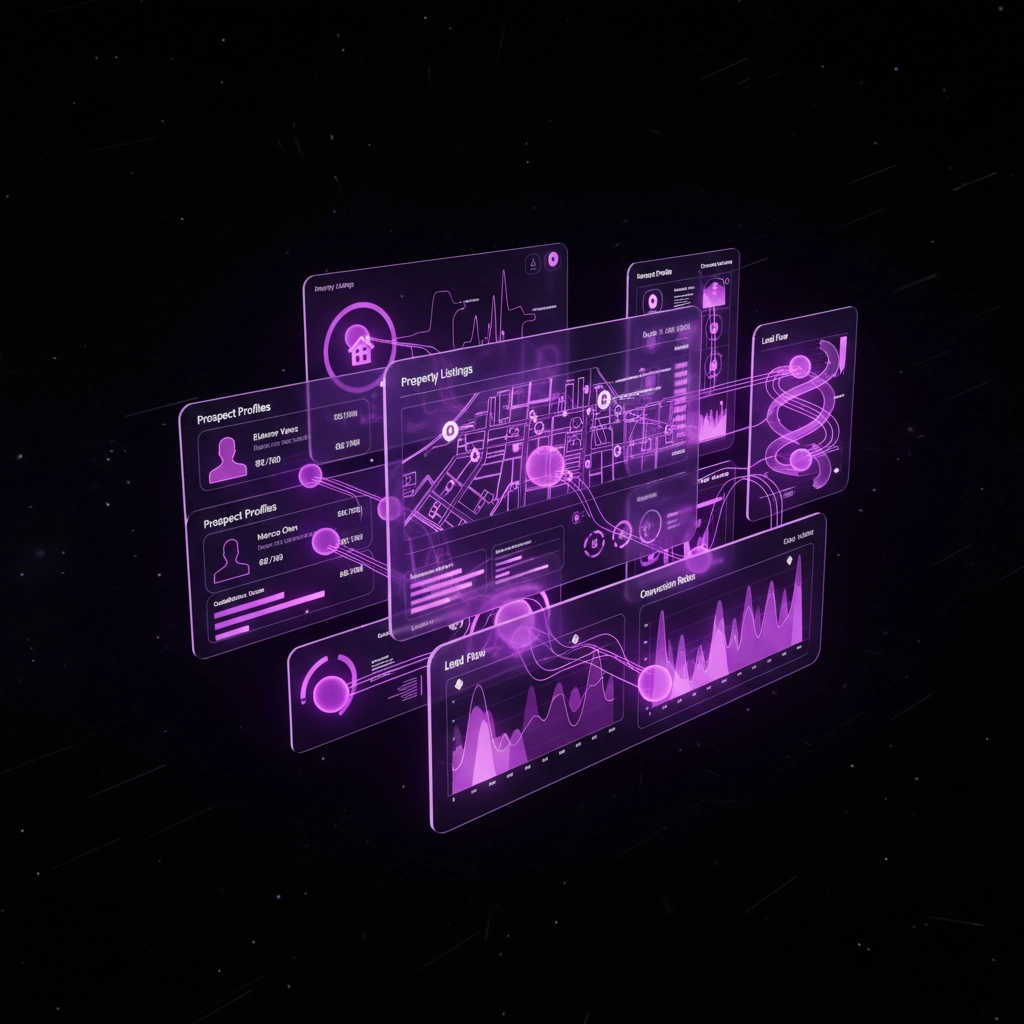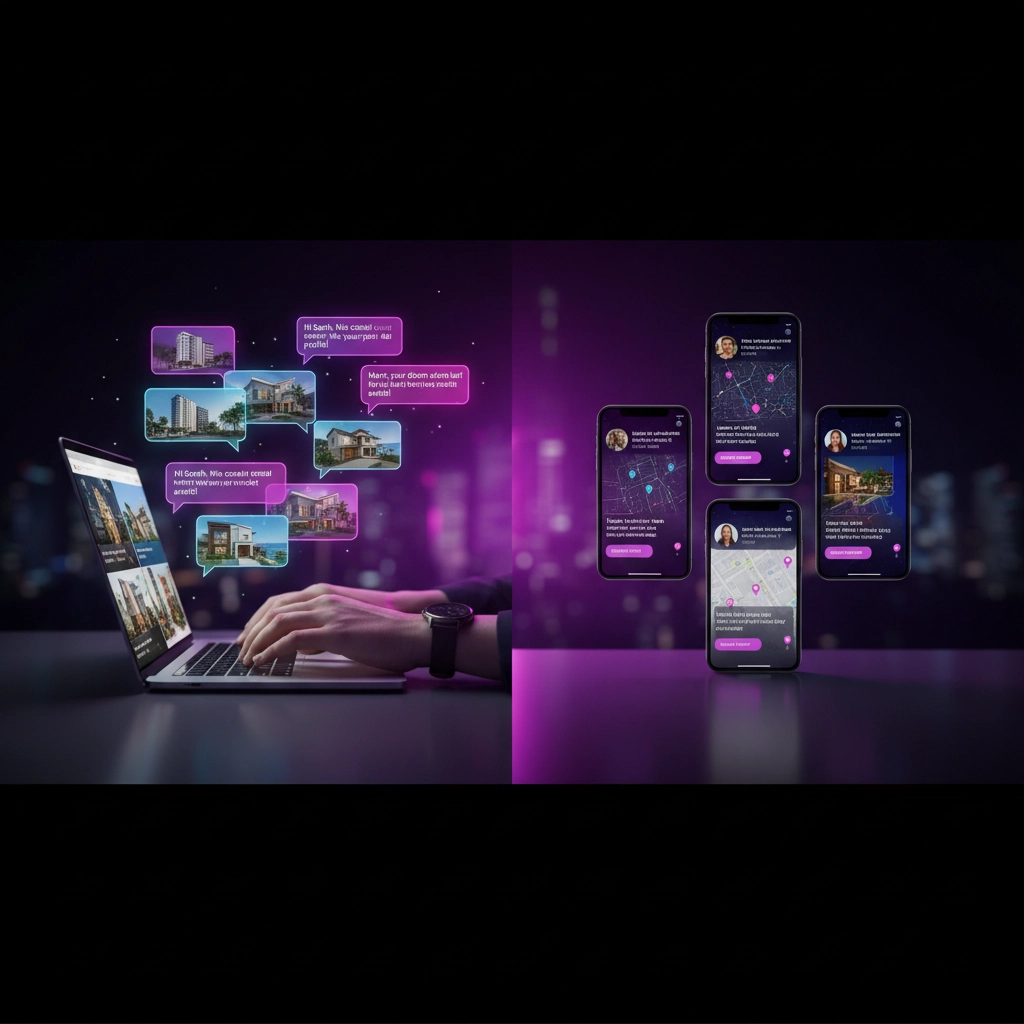Real estate lead generation has shifted from cold calling and door knocking to sophisticated AI systems that identify, qualify, and nurture prospects automatically. Modern agents who embrace these technologies report 50% higher reply rates and dramatically improved conversion metrics.
The transformation centers on data. AI analyzes browsing patterns, demographic information, and behavioral signals to predict which prospects will convert. This eliminates guesswork and allows agents to focus their energy on qualified leads.
Automated Lead Qualification Systems
Traditional lead qualification consumed hours of agent time. Phone calls to uninterested prospects. Emails to people browsing for entertainment. Follow-ups that went nowhere.
AI qualification systems solve this problem by analyzing prospect behavior in real-time. The technology identifies serious buyers and sellers based on specific actions:
- Multiple property views in target price ranges
- Time spent reviewing listing details
- Mortgage calculator usage
- Contact form submissions with detailed information

These systems filter casual browsers from motivated clients automatically. Agents receive qualified leads who have demonstrated genuine intent through their digital behavior.
The impact is immediate. Instead of chasing cold prospects, agents connect with people ready to take action. This shift transforms productivity and reduces frustration from unproductive outreach.
AI Chatbots Transform Initial Contact
Website visitors expect instant responses. Traditional contact forms create delays that lose potential clients. AI chatbots bridge this gap by engaging prospects immediately.
Modern real estate chatbots handle complex qualification conversations:
Initial Engagement: Greet visitors and ask about their property needs
Qualification Questions: Determine timeline, budget, and location preferences
Information Collection: Gather contact details and specific requirements
Appointment Scheduling: Connect qualified prospects with available agents
The technology works 24/7. Prospects browsing late at night or early morning receive immediate assistance. This constant availability captures leads that traditional methods miss.
Advanced chatbots personalize conversations based on visitor behavior. Someone viewing luxury properties receives different questions than a first-time buyer browsing starter homes. This customization improves qualification accuracy and user experience.
Predictive Analytics and Lead Scoring
AI assigns numerical scores to prospects based on conversion probability. This scoring system helps agents prioritize their time and energy on the most promising opportunities.
Lead scoring considers multiple factors:
- Browsing Behavior: Pages viewed, time on site, return visits
- Engagement Level: Email opens, link clicks, social media interactions
- Demographic Data: Location, age, income indicators
- Search Patterns: Specific neighborhoods, price ranges, property types

High-scoring leads receive immediate attention. Medium-scoring prospects enter automated nurture sequences. Low-scoring visitors get periodic follow-ups until their behavior changes.
Some platforms achieve 72% accuracy in predicting homeowners likely to move within 12 months. This precision comes from analyzing over 25 data sources including property records, behavioral patterns, and demographic shifts.
Agents using predictive analytics report better time management and higher closing rates. They focus on prospects with genuine potential rather than spreading efforts across unqualified leads.
Personalized Messaging at Scale
Generic follow-up messages produce poor results. AI personalizes outreach based on individual prospect preferences and behavior patterns.
The system analyzes each prospect’s digital footprint:
- Properties viewed and saved
- Neighborhoods researched
- Price ranges explored
- Timeline indicators from conversations
This data creates personalized message strategies. A prospect viewing family homes receives different content than someone researching investment properties. Messages reference specific properties and neighborhoods that match their demonstrated interests.

Timing optimization is equally important. AI determines when prospects are most likely to engage based on their previous response patterns. Some people respond to morning emails. Others prefer evening outreach.
This personalization extends across all communication channels. Email campaigns, text messages, social media posts, and direct mail pieces all reflect individual prospect preferences. The result is higher engagement rates and stronger relationship building.
For agents managing multiple prospects simultaneously, tools like Pulse Intelligence provide centralized dashboards that track personalization data and automate customized outreach across their entire database.
Data-Driven Performance Insights
AI transforms marketing guesswork into measurable strategies. Agents gain visibility into which activities generate results and which waste resources.
Performance analytics track key metrics:
- Lead Source Performance: Which channels produce the highest-quality prospects
- Conversion Rates: How different lead types progress through the sales funnel
- Response Timing: Optimal outreach schedules for different prospect segments
- Message Effectiveness: Which communication styles generate the best engagement
This data reveals patterns that improve future campaigns. An agent might discover that social media leads convert faster than website inquiries. Or that prospects from certain zip codes prefer phone calls over emails.
The insights eliminate expensive trial-and-error approaches. Marketing budgets focus on proven strategies rather than hopeful experiments. Agents optimize their activities based on measurable results rather than assumptions.
Key Benefits for Real Estate Professionals
AI implementation delivers concrete advantages that improve both productivity and profitability:
Time Savings: Automated qualification and follow-up systems free agents to focus on high-value activities like showing properties and negotiating contracts.
Higher Conversion Rates: Qualified leads convert at higher percentages than unfiltered prospects. Agents close more deals with fewer total contacts.
Improved Client Experience: Instant responses and personalized communication create positive first impressions that build trust and rapport.
Scalable Growth: AI systems handle increasing lead volumes without proportional increases in agent workload. This enables business expansion without overwhelming existing resources.
Competitive Advantage: Agents using AI tools respond faster and more effectively than competitors relying on manual processes.

Better ROI: Marketing investments generate higher returns when focused on qualified prospects with demonstrated interest.
The combination of these benefits creates compound advantages. Faster response times lead to higher conversion rates. Better qualification produces more satisfied clients. Improved efficiency enables handling more transactions.
Implementation Strategies
Successful AI adoption requires strategic planning rather than random tool selection. Agents should evaluate their current lead generation challenges before choosing solutions.
Assessment Phase: Identify bottlenecks in existing processes. Common problems include slow response times, poor qualification, and ineffective follow-up sequences.
Tool Selection: Choose AI platforms that address specific challenges. Lead qualification tools solve different problems than automated nurturing systems.
Integration Planning: Ensure new AI tools connect with existing CRM and marketing platforms. Disconnected systems create data silos that reduce effectiveness.
Training Investment: Team members need training on new technologies. Proper onboarding maximizes tool utilization and prevents costly mistakes.
Performance Monitoring: Track metrics before and after implementation to measure improvement. This data guides future optimization decisions.
Modern real estate professionals who master AI-powered lead generation gain significant competitive advantages. The technology handles routine tasks while agents focus on relationship building and deal closing.
The future belongs to agents who embrace these tools rather than resist technological change. Early adopters establish market position advantages that compound over time as AI capabilities continue expanding.





